research & reports
research & reports
The new tide of militarisation
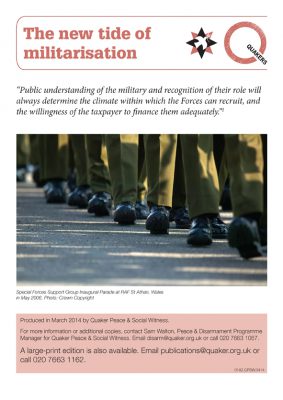
Militarism has existed in the Britain for a long time, but there is a new tide of militarisation that has developed over the last five years. This briefing from Quaker Peace and Social Witness, explores the government strategy to increase public support for the military, in order to raise the willingness of the public to pay for the military, make recruitment easier, and stifle opposition to unpopular wars.
Submission to the Human Rights and the Scottish Parliament inquiry

This submission made by ForcesWatch and Quakers in Scotland to the Scottish Parliament's human rights inquiry details our concerns around the need for regulation and transparent accountability of military activities in schools, the lack of education about peace and human rights, and the continued recruitment of children into the UK armed forces.
Armed forces visits to schools in Scotland: An update for 2016-2017
This ForcesWatch briefing analyses data on armed forces visits to schools in Scotland for 2016-17.
The First Ambush: Effects of army training and employment
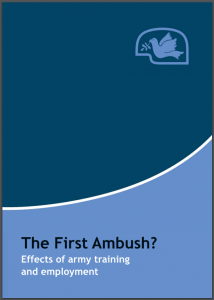
This report from Veterans For Peace UK details how the Army's training process has a forceful impact on attitudes, health, and behaviour even before recruits are sent to war. The findings show that military training and culture combine with pre-existing issues (such as a childhood history of anti-social behaviour) to increase the risk of violence and alcohol misuse. Traumatic war experiences further exacerbate the problem.
Is it Counterproductive to Enlist Minors into the Army?
This article, written by Child Soldiers International and published in the Royal United Service Institute Journal, argues that raising the UK enlistment age from 16 to 18 would bring benefits to young people and the British armed forces. The article explains that the UK’s low enlistment age is counterproductive internationally, as it implies to other countries that it is acceptable to use children under the age of 18 to staff national armed forces.
The Recruitment of Children by the UK Armed Forces: a Critique from Health Professionals
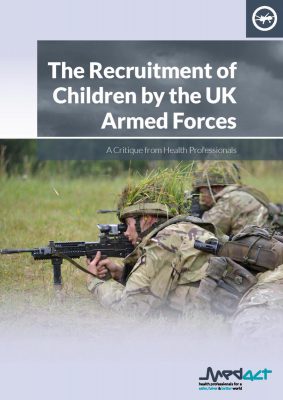
Medact’s report on the long-term impacts of the British military’s recruitment of children under the age of 18, presents evidence linking ‘serious health concerns’ with the policy, and calls for a rise in the minimum recruitment age. It looks at the psychological and psychosocial vulnerabilities of adolescents in the context of military recruitment marketing strategies and making long-term risky decisions and examines the evidence that under 18 recruits face greater risks to health than adult recruits, across the course of an armed forces career.
Soldiers at 16: Sifting fact from fiction

Published by Child Soldiers International, this short and accessible booklet addresses questions often raised about under-18s in the armed forces, presenting the facts - based on extensive research - rather than the fiction. Also contains very useful quotes and statistics. Great when talking to your MP or for those thinking of enlisting!
The British armed forces: Why parental consent safeguards are inadequate
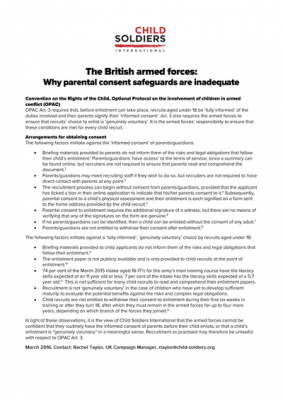
This briefing from Child Soldiers International explains why the armed forces cannot be confident that they routinely have the informed consent of parents before their child enlists, or that a child’s enlistment is “genuinely voluntary” in a meaningful sense.
‘Commonsense and Understanding’: Recommendations from the Defence Committee’s Duty of Care report that are still outstanding 10 years on
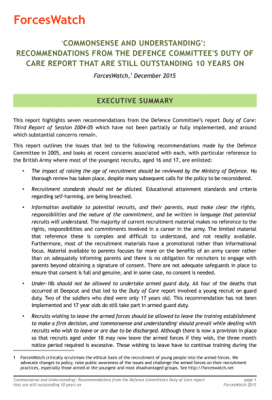
This report highlights seven recommendations from the Defence Committee’s report Duty of Care: Third Report of Session 2004-05 which have not been partially or fully implemented, and around which substantial concerns remain.
This report then discusses the concept of 'in loco parentis' and 'moral obligation' with regard to the army's duty of care towards young recruits, noting that the Defence Committee were concerned in 2005 that the MoD distinguished too rigidly between legal and moral obligations, with the latter as less important.
In 2005, the Defence Committee discussed the lack of balance beween training needs and considerations for operational effectiveness, and thus made its recommendations. Ten years on, it is apparent that operational arguments, and current difficulties meeting recruiting targets, continue to prevent the armed forces from reviewing both their position on enlisting under-18s, and their recruitment practices and materials.
Peace education and the promotion of the armed forces in UK schools

This report highlights that peace education is not being promoted in schools. This is counter to the recommendations made by the United Nations Committee on the Rights of the Child to the UK Government that peace education should be part of the curriculum. This raises concerns particularly with the increased promotion of the military within schools through the Department for Education's 'military ethos' programme and free military-related learning resources, and as the armed forces continue to conduct a substantial 'youth engagement' programme.
